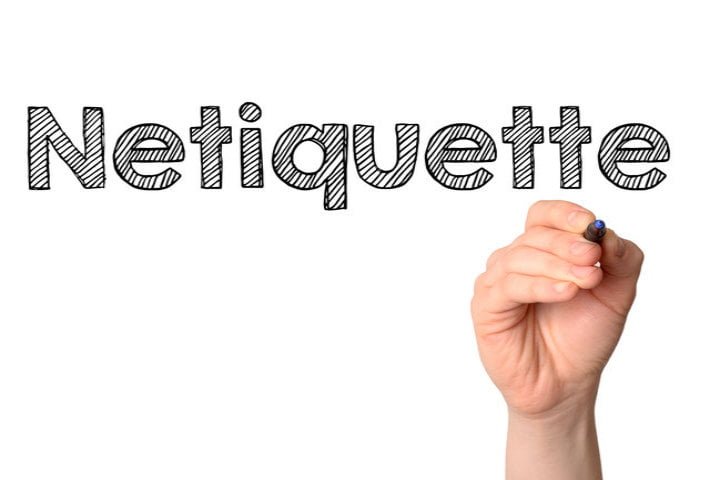- The Ever-Evolving Landscape of Social Media: A Comprehensive Guide in 2024
- Role of Media in Democracy
- 4 Types of Cyber Crime in India: The Dark Side of the Digital Age
- Netiquettes: 3 Important Online Etiquette in the Digital Age
In today’s interconnected world, where the lines between our digital and physical lives are increasingly blurred, understanding and practicing proper online etiquette, or “netiquettes,” has become more crucial than ever. As we are increasingly getting accustomed to the internet, from social media platforms to professional email communications, following these unwritten rules of online behavior ensures a respectful, productive, and harmonious digital environment for all.
In This Article
Meaning and Importance of Netiquettes
Netiquettes, a blend of “network” and “etiquette,” refer to the set of social conventions and best practices for polite and respectful online communication and interaction. These rules are crucial for upholding decorum, cultivating strong connections, and encouraging efficient communication in a variety of digital contexts.
The importance of netiquettes cannot be overstated in our increasingly digital world. With millions of individuals joining the online community every year, understanding and following these principles is crucial for several reasons:
- Promoting Respectful Interactions: Netiquettes help create a culture of respect and consideration in online spaces, reducing conflicts and misunderstandings.
- Enhancing Communication Effectiveness: By following netiquettes, we can ensure our messages are clear, concise, and well-received by our intended audience.
- Protecting Personal and Professional Reputation: Adhering to netiquettes helps maintain a positive online presence, which is increasingly important in both personal and professional contexts.
- Safeguarding Privacy and Security: Many netiquettes rules revolve around protecting one’s own and others’ privacy, a critical aspect of online safety.
- Enabling a Positive Online Community: When everyone follows netiquettes, it contributes to a more inclusive, supportive, and enjoyable online environment for all users.
Understanding of Netiquettes
It is important to explore a few fundamental topics that underpin online etiquette in order to understand the concept of netiquettes. Let’s explore these crucial elements:
Identification of Oneself
One of the fundamental principles of netiquettes is the proper identification of oneself in online interactions. This aspect is particularly important in professional settings or when interacting with strangers online. Here are some key points to consider:
- Use your Real Name: When appropriate, use your real name instead of pseudonyms or nicknames, especially in professional contexts.
- Provide Context: When reaching out to someone, introduce yourself and explain the purpose of your communication.
- Use Appropriate Profile Pictures: Choose profile pictures that are suitable for the platform and context of your interactions.
- Be Transparent. If you’re representing an organization or speaking on behalf of someone else, make that clear in your communication.
Respect for Others’ Privacy

In the digital age, privacy has become a precious commodity, and respecting others’ privacy is a crucial aspect of netiquettes. This concept goes hand in hand with understanding the importance of privacy in general.
Privacy Definition
Privacy refers to the right of an individual to keep their personal information, habits, and relationships confidential and free from unauthorized access or intrusion. In the context of online interactions, privacy meaning is the control individuals have over their personal data, the information they share, and who has access to it.
To respect others’ online privacy, consider the following guidelines:
- Ask for Permission: Always ask for permission before sharing someone else’s personal information, photos, or content.
- Be Mindful of Tagging: When posting photos or content that includes others, ask if they’re comfortable being tagged or mentioned.
- Respect Boundaries: Don’t pry into personal matters or ask intrusive questions in public forums or social media platforms.
- Protect Confidential Information: If someone shares private information with you, keep it confidential unless given explicit permission to share.
- Be Aware of Privacy Settings: Familiarize yourself with the privacy settings of various platforms and respect others’ chosen privacy levels.
Use of Appropriate Language and Imagery

The way we express ourselves online, through both words and images, plays a significant role in how our messages are perceived and received. Using appropriate language and imagery is crucial for effective communication and maintaining a respectful online presence. Here are some key points to consider:
- Mind Your Tone: Remember that written text can be easily misinterpreted. Use a polite and respectful tone, and be mindful of how your words might be perceived.
- Avoid All Caps: It is best to avoid writing in all capital letters, as it can be seen as shouting and may come across as aggressive or rude.
- Ensure Proper Grammar and Spelling: Correct grammar and spelling are crucial in professional or formal settings.
- Be Mindful of Cultural Differences: It is important to be aware of cultural differences, as what may be acceptable in one culture could be offensive in another.
- Use Emojis Judiciously: Be mindful of your use of emojis. While they can enhance the meaning and emotion of your messages, excessive or inappropriate use can come across as unprofessional or unclear.
- Use appropriate imagery: When sharing images or memes, make sure they are suitable for your audience and avoid anything offensive, discriminatory, or inappropriate.
Do Not Spam

Spam Meaning
Spam is any form of unwanted, unsolicited, irrelevant, or inappropriate messages sent over the Internet, typically to a large number of users, for the purposes of advertising, phishing, spreading malware, or simply causing annoyance. Understanding what constitutes spam is crucial for maintaining good netiquettes.
One of the most important netiquettes is to avoid spamming. To adhere to this important netiquettes, consider the following guidelines:
- Don’t Send Unsolicited Messages: It is important to refrain from sending promotional content or requests to individuals who have not explicitly agreed to receive them.
- Respect Opt-Out Requests: It is important to promptly honor any requests to be removed from your mailing list or communication.
- Avoid excessive Cross-Posting: When sharing your message, it is best to avoid posting it in multiple forums, groups, or comment sections. This helps keep things organized and prevents unnecessary repetition.
- Use Relevant Subject Lines: Make sure to use subject lines that accurately reflect the content of your email. This will help ensure clarity and honesty in your communication.
- Be Cautious with Forwarding: Consider the content and validity of chain messages, jokes, or unverified information before sharing them with a large audience.
- Respect Group Rules: Please follow the community guidelines when participating in online forums or groups. This includes avoiding promotional content and staying on-topic during discussions.
Spam Score Checker
If you are worried about your content being flagged as spam, a spam score checker can assist. A spam score checker is a tool that assesses your email content or website for common spam triggers and gives you a score to indicate the likelihood of your content being marked as spam.
There are various online tools available that provide services for checking spam scores. These tools typically analyze various factors, such as:
1. Use of certain words or phrases commonly associated with spam
2. The ratio of images to text
3. The presence of attachments
4. The use of URL shorteners
5. The reputation of the sender’s domain
By using a spam score checker, you can identify potential issues in your content, make necessary adjustments to improve deliverability, and ensure your messages comply with netiquettes.
The Role of Privacy in Netiquettes
Privacy is a fundamental aspect of netiquettes and plays a crucial role in maintaining a safe and respectful online environment. Let’s explore the concept of privacy and its importance in the digital world.
Privacy Policy
A privacy policy is a document that provides information about how a party collects, uses, discloses, and manages a customer’s or client’s data. It fulfills a legal requirement to protect a user’s privacy.
In the context of netiquettes, respecting and adhering to privacy policies is essential. This includes:
- Reading and Understanding Privacy Policies: Before using any new online service or platform, it is important to read and understand its privacy policy.
- Respecting others’ Privacy Choices: It is important to respect others’ privacy choices. If someone has set their profile to private or chosen not to share certain information, it is crucial to honor their decision.
- Being Transparent about your own Privacy Practices: When collecting data from others, it is important to be transparent about your privacy practices. Clearly communicate how you will use and protect the information you collect, especially for activities like newsletters or online communities.
Privacy Settings

Most online platforms and social media sites offer privacy settings that allow users to control who can see their content and personal information. Understanding and properly configuring these settings is a crucial aspect of netiquettes.
Key points to consider regarding privacy settings:
- Regularly Review Your Settings: It is crucial to regularly review your settings, as privacy policies and options can be subject to change.
- Be selective about what you Share: It is important to be cautious about what you share online. Even if you have strict privacy settings, keep in mind that anything you post has the potential to become public.
- Use Two-Factor Authentication: Enable two-factor authentication for enhanced security when it is available.
- Be Cautious with Third-Party Apps: Exercise caution when using third-party apps that connect to your social media accounts. Pay attention to the permissions you grant them.
Conclusion
It is crucial to grasp and implement proper netiquettes in our digital era to cultivate a positive, respectful, and productive online environment. These guidelines assist us in navigating the complex landscape of online communication by respecting others’ privacy, avoiding spam, and using appropriate language.
Through various examples, it is evident that netiquettes are not merely abstract rules but rather practical principles with tangible real-world implications. When engaging online, following netiquettes can greatly enhance your experiences and relationships. This applies to students working on group projects, professionals networking on LinkedIn, or anyone sharing their thoughts on social media.
Keep in mind that the digital world is closely connected to our real-world communities. When we treat others online with respect and consideration, we help create a more inclusive, safe, and enriching internet experience for everyone.
With the ever-changing landscape of technology and the emergence of new platforms, netiquettes may evolve, but the principles of respect, consideration, and responsible behavior will always be relevant. It is important to stay informed, be cautious of your digital footprint, and aim to have a positive impact on your online interactions.
By following these guidelines, we can all contribute to creating a more positive digital future.




